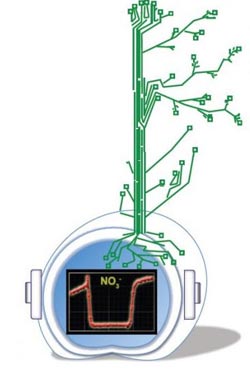Nitrogen-tracking tools for better crops and less pollution

The NiTrac sensor developed by Cheng Hsun Ho and Wolf Frommer of the Carnegie Institution for Science will enable non-invasive real-time monitoring of nitrogen acquisition in action in plant roots, providing a new tool set that can be used to improve nitrogen efficiency. The novel sensor technology is widely applicable and useful also for cancer and neurobiology.<br><br>Credit: Cheng Hsun Ho and Wolf Frommer<br>
This means that on the scale of food crops, adding significant levels of nitrogen to the soil through fertilizer presents a number of problems, particularly river and groundwater pollution.
As a result, finding a way to improve nitrogen uptake in agricultural products could improve yields and decrease risks to environmental and human health. Nitrogen is primarily taken up from the soil by the roots and assimilated by the plant to become part of DNA, proteins, and many other compounds.
Uptake is controlled by a number of factors, including availability, demand, and the plant's energy status. But there is much about the transport proteins involved in the process that isn't understood. New work from Carnegie's Cheng-Hsun Ho and Wolf Frommer developed tools that could help scientists observe the nitrogen-uptake process in real time and could lead to developments that improve agriculture and the environment. It will be published by eLife on March 11 and is already available online.
Frommer had previously developed technology to spy on transport protein activity by using fluorescent tags in a cell's DNA to monitor the structural rearrangements that a transporter undergoes as it moves its target molecule. They tailored this technology to five nitrogen transport targets to monitor the nitrogen uptake and assimilation process.
“We engineered these sensors to monitor the activity and regulation of suspected nitrogen transporters in living plant roots, which otherwise are impossible to study,” Frommer said. “This suite of tools will vastly improve our understanding of the nitrogen-uptake process and will help to develop increased crop yields and decrease fertilizer-caused pollution.”
Their method is applicable to any transporter from any organism, thereby enabling the otherwise exceptionally difficult analysis of transport processes in the tissues of plants and animals.
This work was funded by the NSF
Media Contact
More Information:
http://www.carnegiescience.eduAll latest news from the category: Agricultural and Forestry Science
Newest articles

New model of neuronal circuit provides insight on eye movement
Working with week-old zebrafish larva, researchers at Weill Cornell Medicine and colleagues decoded how the connections formed by a network of neurons in the brainstem guide the fishes’ gaze. The…

Innovative protocol maps NMDA receptors in Alzheimer’s-Affected brains
Researchers from the Institute for Neurosciences (IN), a joint center of the Miguel Hernández University of Elche (UMH) and the Spanish National Research Council (CSIC), who are also part of…

New insights into sleep
…uncover key mechanisms related to cognitive function. Discovery suggests broad implications for giving brain a boost. While it’s well known that sleep enhances cognitive performance, the underlying neural mechanisms, particularly…



